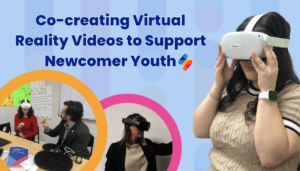Disclaimer: Please note that this blog was developed several years ago, and as a result, some of the external links may no longer be functional. We apologize for any inconvenience this may cause. If you require assistance in gathering additional resources or need further information, we encourage you to fill out a Technical Assistance request form. Thank you for your understanding.
Last updated: August 8, 2020
As we continue practicing social distancing amid COVID-19, you may be wondering how to stay in touch with your clients and continue job readiness training. While you may not be able to resume your job readiness classes in person for some time, there are many online resources you can share to keep your clients engaged and focused on their career paths. This blog post provides suggestions tailored towards clients who have computers or smartphones, internet access, and higher levels of digital literacy. For remote job readiness training ideas appropriate to clients with lower digital literacy and/or online access, read Remote Job Readiness Resources for Clients with Lower Levels of Digital Literacy.
Using Online Resources with Clients
- Assess clients’ digital abilities and computer/internet access. For some clients, online resources will not be appropriate options. Others may be more comfortable using mobile apps on smartphones than computers. Be aware of which resources are mobile-friendly and give clients flexibility to use the technology with which they are comfortable.
- Make a plan. How will you share these resources with clients? When will you do it? How can clients contact you if they have questions? Stay flexible and make adjustments as you see what works, but start with a written plan to help ensure successful follow through.
- Ensure content is appropriate. Just as you do in the classroom, tailor your job readiness resource suggestions to each of your clients’ English levels, skills, and career interests. Not all resources suggested below will be appropriate for all clients.
- Keep security in mind. When considering how you will share materials, be aware of security concerns, such as limitations on the protection of any confidential information you may collect or possible intrusions into video conferences.
- Keep communication clear and concise. Consider picking one or two resources to email or text to your clients every couple of days, rather than sending a long list of websites all at once. Give clear instructions on how to access the tool and when you will be in touch again.
- Follow up regularly. After sending a link to a specific tool, follow up a day or two later to learn if the client was able to complete the assignment, ask a related question to spark dialogue on the topic, etc.
- Frame job search information to the recent economic changes. Help clients broaden and adjust their expectations within our currently difficult and unusual job market.
- Challenge clients to set realistic goals for their job search over the next couple of weeks and ask what support they need to reach those goals.
Interactive e-Learning Resources
Switchboard’s e-learning course list includes several English-language e-learning courses designed for clients to complete independently, all produced by the former technical assistance provider Higher. After registering with an email address, clients can access each of the following free courses:
- How to Complete a Job Application introduces the purpose of job applications in the U.S. as well as guidelines for completing paper and online job applications.
- How to Answer Behavioral Interview Questions provides an overview of behavioral interview questions and highlights specific characteristics that every employer values in potential employees.
- Workplace Culture introduces the importance of rules in the U.S. workplace and reviews common behaviors that impact success.
- Understanding Your Paycheck is a brief course that includes sample paychecks and discusses how to check a paystub for accuracy.
- Income Taxes 101 covers the basics of paying income tax in the U.S., including what it is, why everyone must pay it, how to pay it, and how to find help in filing taxes.
Newly added! Upwardly Global has made several e-learning courses available for free until October 1, 2020. These courses are designed for job seekers with an intermediate to advanced level of English, along with some vocational or technical training, or a bachelor’s degree or higher:
- Preparing for the U.S. Job Search
- Enhancing Professional English Language Communication
- Mastering the Phone Interview
- Updating and Improving LinkedIn Profiles
Cultural Orientation Resource Exchange (CORE) has developed multilingual, interactive online content on topics including Working in the U.S., Money Management, Learning English, and Education. Content is accessible via phone and computer:
- The Settle In smartphone app provides interactive resources in Arabic, Burmese, English, Dari, Kinyarwanda, Russian, and Swahili. A desktop version of the app is also available here.
- CORENav website provides videos, fact sheets, and audio podcasts on the same topics and in the same languages, with the additions of Farsi and Somali.
USAHello offers adult education and job readiness resources specifically for English learners and those with interrupted educations. Clients can connect with free online ESL and GED preparation courses (and can also access articles about resume tips, workers’ rights, women at work, starting a business, and more):
- Free Online GED Preparation Classes include units in Math, Social Studies, Language Arts, and Science.
- GED Practice Test provides a practice exam in Math.
- ESL Online Courses and Apps is a list of various websites and apps for learning English.
Short Videos
- Newly added! International Rescue Committee (IRC) has released several video series on topics including Work Readiness during COVID-19 (Arabic, Burmese, Farsi, Rohingya, Spanish, and Swahili), Financial Capabilities (Arabic, Burmese, Dari, Rohingya, Spanish, and Swahili), and Public Benefits in the United States (Arabic, Burmese, Farsi, Rohingya, Spanish, and Swahili).
- Switchboard’s new 4-part video series Adjusting to Life and Work in the U.S. features clients sharing their advice on various topics related to life and work in the U.S. Each video also includes a companion document that provides discussion prompts that you can use to facilitate conversation with clients.
- Forced Migration Upward Mobility Project has produced Creating Welcome for Refugees: Livelihood Spotlights, a series of 2-minute videos featuring nine different refugees in the U.S. They explain how they have obtained meaningful work in various career paths.
- The U.S. Department of Labor (DOL)’s CareerOneStop offers brief career videos about hundreds of different job choices, including construction; healthcare; hospitality; manufacturing; science, technology and engineering; and many more.
More Useful Resources from DOL’s CareerOneStop
CareerOneStop offers several free, online resources that can benefit advanced English speakers (in addition to the videos mentioned above), including:
- Job search guidance such as how to create a job search plan and research employers
- Networking tips
- Resume and application protocols and samples
- Interview preparation, common questions, tips and thank you notes
- Self-assessments to identify personal skills and occupations that might be a good match
- Tips for setting SMART career goals
While this unexpected season comes with serious stressors and challenges, leveraging alternative job readiness resources can keep career goals in sight and give you and your clients a feeling of progress. Clients will likely be glad to hear from you and encouraged to know there are still meaningful ways to move forward with their job readiness preparation while so much of the world feels paused.










